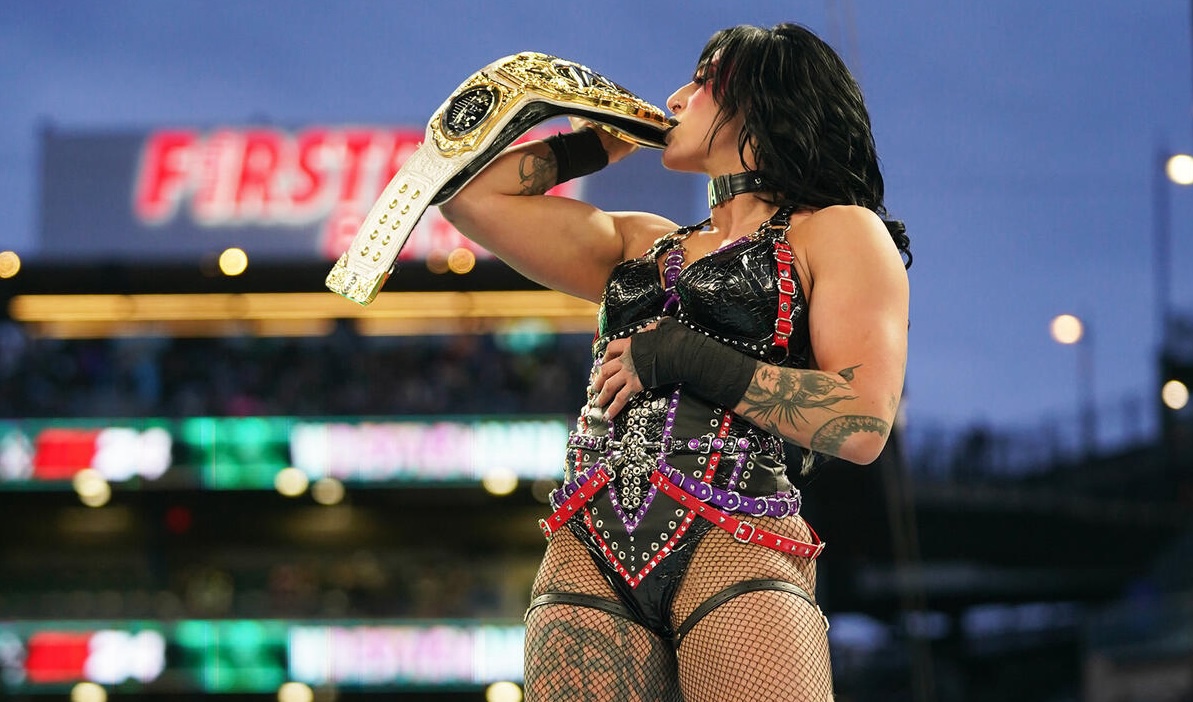
Rhea Ripley defeated Becky Lynch to retain the WWE Women’s World Championship at WrestleMania 40 (Night One).
In a recent interview with “The Ten Count” podcast at “WWE World”, Ripley revealed that she had a panic attack a couple of hours before her title match at WrestleMania 40 (Night One).
Mami said, “It’s quite funny how this whole thing works in this crazy world. I legit was having a straight-up panic attack two hours before I walked through the curtain, and I was violently shaking, just nervous. If you don’t get nervous before you go out, especially at WrestleMania, you obviously don’t love it enough. That’s the way I think about it. So I’m glad the nerves were there. But at the same time, that was sort of taking over my body. So when I got to step through into the stage with the band Motionless in White, all those nerves that I had just sort of flew away. I was in the zone, I was moshing out like it was a little mosh pit. I was living in the moment, and that’s what I love about this business. We get to live in the moment a lot of the time. I just snap into Rhea Ripley, and I’m instantly comfortable, instantly ready to go and ready to fight.”
In a recent appearance on the “Gabby AF” podcast, WWE SmackDown General Manager Nick Aldis explained why now is the best time to be a WWE Superstar and predicted the company’s future.
Aldis said, “I can certainly say I can’t imagine there’s a better time to be a WWE superstar than right now. Obviously the money, and the schedule, because if you were on Hogan’s train in the ’80s that was great, right? But you were probably away from your family 29 days out of every month, probably not too different in the Attitude Era either. We’re really just in the beginning of it, the sky’s the limit. I’ve got some really big kind of predictions for where we go after the Netflix deal, and I think there’s some innovations that will probably take place within WWE in the next year or two years [that] will exponentially grow this brand and this phenomenon even more — more globally than it’s ever been.”
Rhea Ripley, the current WWE Women’s World Champion, recently revealed that she experienced a panic attack just hours before her title match at WrestleMania 40 (Night One). In an interview with “The Ten Count” podcast at “WWE World,” Ripley opened up about her nerves and how she overcame them to deliver a memorable performance.
Ripley expressed that feeling nervous before a big match, especially at WrestleMania, is a sign of passion and love for the sport. She believes that if a wrestler doesn’t feel nervous, it indicates a lack of dedication. Despite her panic attack, Ripley embraced the nerves and used them as fuel for her performance.
The WWE superstar shared that as she stepped onto the stage with the band Motionless in White, all her nerves vanished. She described being in the zone and compared it to being in a mosh pit. Ripley emphasized the joy of living in the moment and how she instantly transforms into her wrestling persona, Rhea Ripley, when she steps into the ring.
This revelation from Ripley highlights the mental and emotional challenges that wrestlers face before stepping into the spotlight. It humanizes these larger-than-life athletes and shows that even champions like Ripley experience vulnerability and anxiety. Her ability to channel her nerves into a powerful performance serves as an inspiration to aspiring wrestlers and fans alike.
In another interview on the “Gabby AF” podcast, WWE SmackDown General Manager Nick Aldis discussed the current state of WWE and its future prospects. Aldis expressed his belief that there has never been a better time to be a WWE superstar. He cited factors such as the financial rewards and more manageable schedules compared to previous eras.
Aldis also predicted that WWE’s growth will continue exponentially in the coming years, especially after the Netflix deal. He anticipates innovative changes within the company that will further expand its global reach. Aldis’ positive outlook reflects the ongoing evolution of professional wrestling and the opportunities available to WWE superstars.
Overall, these interviews shed light on the behind-the-scenes experiences of WWE wrestlers and the exciting future prospects for the company. Rhea Ripley’s admission of her pre-match panic attack demonstrates the mental fortitude required to excel in the industry. Nick Aldis’ predictions for WWE’s growth hint at a promising future for both the company and its dedicated fanbase.
